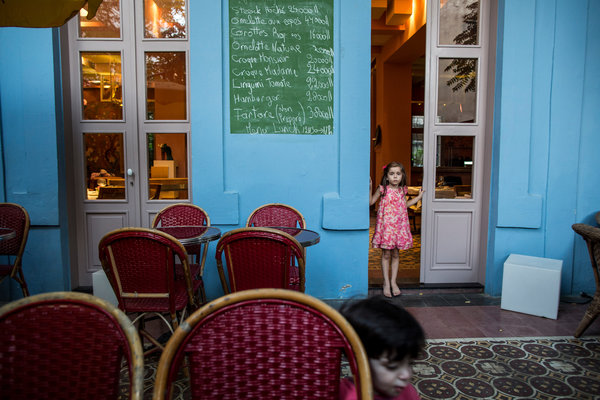Cheikh Chafic El Khazen (1905-1977) Cheikh Chafic El Khazen was the son of Barbar Beik El Khazen, (أمير آلاي الجند اللبناني), and Ms. Therese Ghandour Beik El Saad, sister of Habib Bacha el Saad. He was born in 1905 in Ghosta. He was taught the basics in education by a private tutor, and then he […]

By JAY CHESHES NYTimes traveler – I was finishing an aperitif on the porch at Villa Clara while other guests tossed pétanque balls in the nearby yard. The hotel’s 4-year-old namesake cozied up to her papa, showing off her latest crayon creation. “Oh, c’est magnifique,” said Olivier Gougeon, a French chef and an owner of the property with his wife, Marie-Hélène, an editor of a French-language home décor magazine.
The tiny boutique hotel, its restaurant and guest rooms stocked with Parisian antiques, opened last year around the corner from an Asterix chicken shack and across the street from its neighborhood boucherie. But this was not Marseille or Lyon, it was the eastern edge of Beirut.
“A Frenchman can easily live in Beirut without feeling displaced,” said Mr. Gougeon, who moved to the Lebanese capital from Paris in 1999, as he sipped local wine in Villa Clara’s leafy backyard after cooking a dinner of crispy-skinned duck confit and old-fashioned île flottante.
For more than a century, through all manner of turmoil, including a 15-year civil war and, more recently, ongoing conflict in neighboring Syria, a distinctly French character has pervaded the city. Much of it is the legacy of the French colonial period — the mandate that lasted from 1920 to 1943 — but a cultural kinship goes back much further than that.

The Internet is a decentralized global network, designed to be resilient and hard to take down. But it’s still possible to black out a certain area, or even an entire country, disconnecting it from the rest of the world.
That’s what happened in Egypt in 2011 and three times in Syria in just the last year.
Were these waves of blackouts the result of technical failures? Or does Syrian President Bashar al-Assad’s regime have stronghold over the country’s Internet access? Most likely yes, according to experts.
"This is only possible if the government has complete control over the telecommunications infrastructure," said John Shier, of the security firm Sophos.
Even if Syria doesn’t have complete control, it has a stranglehold over the network’s single point of failure: the state-controlled Syrian Telecommunications Establishment (STE), which maintains "the primary flow of Internet traffic in and out of the country," according to David Belson, the editor of network security firm Akamai’s State of the Internet quarterly report.

The 11-year-old son of Syrian president Bashar al-Assad is suspected of posting a diatribe on Facebook that calls American soldiers "cowards with new technology" and dared the U.S. to attack, Liam Stack of The New York Times reports.
Stack writes that if the post is a hoax, "it is either a highly elaborate one involving dozens of fake accounts purporting to belong to the children of other regime insiders, or a forgery so impressive that some of those children themselves — including the boy’s cousins — have been fooled."
Read moreMarch 14 sources told NOW on Wednesday that President Michel Suleiman has proposed for the upcoming cabinet to include Hezbollah representatives without providing them with veto-power. According to the sources, Suleiman’s proposal would offer eight ministries to the March 14 alliance, eight to the March 8, including Hezbollah representatives, and eight to representatives of the […]
U.K. Prime Minister David Cameron’s failure to win parliamentary approval for military strikes against Syria complicates a decision by U.S. President Barack Obama on how to hold the Syrian government accountable for an alleged chemical weapons attack on civilians. With the House of Commons rejection of a plan from Cameron for use of military force, […]
With all eyes on Syria, ABC News has announced plans to reopen a bureau in Beirut, Lebanon. The network’s first bureau there was opened in 1968 by Peter Jennings and closed in the 1990s. “Beirut was a city Peter Jennings made his own. So it’s fitting – and timely – that ABC News is returning […]
by Michael Kelly – Business Insider – There are three primary reasons, as illustrated by this report by Krishnadev Calamur of NPR. 1) Strategic: Syria’s port of Tartus hosts the only remaining international military base outside of the former Soviet Union. 2) Financial: As of June 2012, Russia’s economic interests in Syria total approximately $20 billion, about […]
ALEPPO, Syria — Aleppo is basically “Little Syria,” a melting pot, representative of the diverse ethnic and religious groups that make up the nation. Christians in Aleppo have tended to live together in close-knit communities in neighborhoods usually clustered around churches. It would be very accurate to describe some areas of Aleppo as “Christian,” although […]
